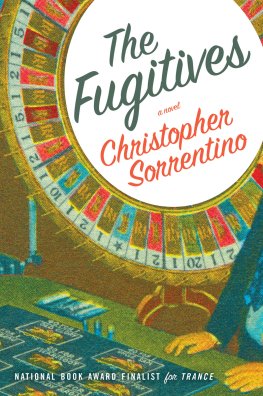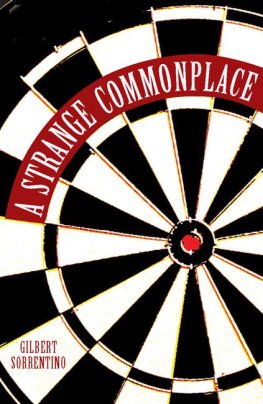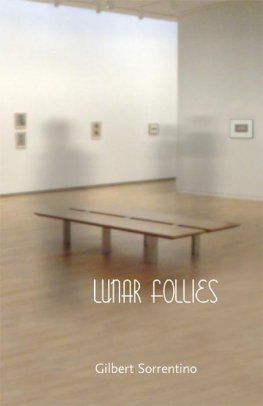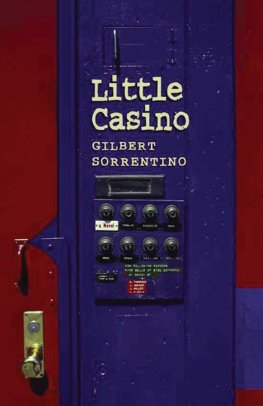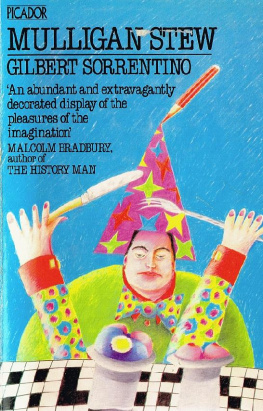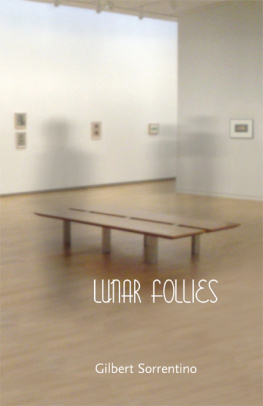Christopher Sorrentino
The Fugitives
The founders of a new colony, whatever Utopia of human virtue and happiness they might originally project, have invariably recognized it among their earliest practical necessities to allot a portion of the virgin soil as a cemetery, and another portion as the site of a prison.
NATHANIEL HAWTHORNE
. . there is a time in life when you just take a walk: And you walk in your own landscape.
WILLEM DE KOONING
. . the pictures we paint we are also being shown.
ALEXANDER THEROUX
For the intense yearning which each of them has toward the other does not appear to be the desire of lovers intercourse, but of something else which the soul of either evidently desires and cannot tell, and of which she has only a dark and doubtful presentiment.
ARISTOPHANES, AS QUOTED IN SYMPOSIUM
THIS is long ago in the history of Anishinabek, the name we call ourselves. You all are familiar with Ojibway, or Chippewa. But like the private name one is called within his family, Anishinabek is the name we use among ourselves. This is long ago, before Cherry City, before any outsiders arrived at all, near to the time when the Original Man was lowered to earth to name everything and begin our history.
The great trickster Nanabozho always was looking for ways to make fools of humans and beasts, to show how foolish they truly were underneath what they showed to the world. He always was looking, but he never had to look very hard. One day, he was seated at the edge of a village with his friend Elk, watching two old women who lived in wigwams next to each other talking happily as they worked side by side. Elk remarked, They say those two never fight. And Nanabozho, whod been daydreaming about the fishing he would do later after Elk had returned to the woods, suddenly was very alert. Never? he asked. Never, said Elk. And it was true. The two women had known each other their entire lives, and their like-mindedness was legendary. Theyd never argued, never disagreed about anything, and this was unusual, especially for women. Elk continued, Theyve never fought about men. Theyve never fought about work. Theyve never fought about their children. Theyve never fought over which of them was smarter, or prettier. Nanabozho shook his head. Thats very unusual, especially for women, he said. Never, you say? Never, said Elk. Ill bet I can get them to fight, said Nanabozho. Id like to see you try, said Elk. So Nanabozho got up and dusted himself off. He told Elk, Ill bet you your hat, and even though it was a brand-new hat that Elk was quite proud of, he agreed. Nanabozho asked to borrow the hat and carried it over to the bushes, where he picked a handful of blueberries, mashed them into a dark blue mess, and then painted one side of the hat a rich, dark blue. Then he went and gathered a handful of strawberries, and mashed them into a bright red mess, and painted the other side of the hat a bright red. My hat, complained Elk, what are you doing? Be innocent of the knowledge, cautioned Nanabozho, until you applaud the deed. Then he put the hat on his head and set off through the woods. The two old women had just finished dressing two rabbits and each had gone back to sit outside her wigwam, the game directly between them, lying on a flat stump they used. Nanabozho sneaked through the trees until he was behind the wigwams and then, catching Elks eye, put a finger across his lips. Then he ran as fast as he could between the two wigwams, whooping and shouting, and grabbed the two rabbits as he passed. He ran until he got back to where Elk was waiting. I dont eat rabbit, said Elk, who was still annoyed about his hat. Wait for a little while, said Nanabozho.
They didnt have to wait for very long. The two old women were shrieking and crying about the maniac whod scared them to death and run screaming into the woods with their game. Soon a group of people from the village had gathered to see what the matter was. What did he look like? one man asked. Oh, he was at least ten feet tall, said one of the old women. Thats right, agreed the other, adding, and he had huge claws. He did, confirmed the first old woman. It seems that theyre still quite agreeable, said Elk, dryly. Just wait, said Nanabozho. And he was covered with hair, continued the first old woman. All over his body, added the second old woman, except where he was wearing those tooled leather moccasins. They were fine moccasins, said the first old woman, blue, just like his hat. No, said the second old woman. His hat was bright red. Dear, said the first old woman, that hat was most certainly blue. Dear, it was red. I saw it with my own eyes. Well, said the first old woman, those old eyes of yours must be playing tricks on you. It was definitely a blue hat. Ive had sharper eyesight than you ever since we were children, said the second old woman, peevishly. Not likely, snorted the first. Theres never been anything youve been better at than I. Oh, my, said Elk. And, as you can imagine, things went downhill from there. Soon these two old women, inseparable since birth, were at each others throat and had to be separated by two strong young men. Even hours later they were still grumbling at each other about the color of that hat, and anything else that they could think of. And Nanabozho didnt have to say a word to Elk, who knew that, as usual, Nanabozho had had his way with them. And Nanabozho had a wonderful new hat into the bargain.

STORY time is at eleven, the preschoolers and their mothers, mostly the mothers; the occasional father looking faintly uncomfortable with his kid, as if hed been asked to monitor an unfamiliar piece of equipment; sometimes babysitters, unhurried grandpas, older siblings icy with shame. Tuesday and Thursday mornings they arrive and cluster around the bronze bear, its paws, snout, and ears worn smooth and dull, to listen. Before John Salteau began, a few months ago, to tell stories twice each week at the library (Tricksters and Sleeping Bears: Native Tales from Northwestern Michigan with John Salteau), they had a woman whose pedantic cheer fooled none of the kids: sung and shouted drills involving colors, numbers, the names of household objects. She drove up once a week from Frankfort with a steel-string guitar and a cinnamon-colored puppet named Ginger and played to a half-empty room every time. Now shes gone. Salteau invariably fills the place.
I began to sit in the library some mornings because I like the stripped tone; the clean isolation of the footfalls and the scraping of chairs against the floor, the stillness in which other peoples most perfectly ingrained habits are encased and displayed. This one wets his index finger. This one moves her lips. Nose pickers and foot tappers. Plus its a nice place to come to rest in the middle of my morning circuit, when the work is done or (more likely, these days) stalled and I leave home to walk the arboreal streets (my house is between Oak and Maple; nearby are Cedar, Pine, Locust, Elmwood) or wander onto the nearby grounds of the former lunatic asylum, now a curiously mournful park.
If I arrive at the library before eleven, Ill wait. Theres no other feeling like that of the restraint in a quiet room filled with people. Conditional unity, breached under the duress of petty bodily betrayals, farts and sneezes. The heads come up, mildly curious, then fall once more to the printed lines. One time, a middle-aged man, in a suit and tie, sat energetically turning the pages of the Record-Eagle, as if he were scanning it for a particular item: he was gently urged from the premises by a library employee who bent close to whisper to him, laying a quieting finger on the pages of newsprint. The man left, striding through a watchful silence, his newspaper abandoned on the table.

